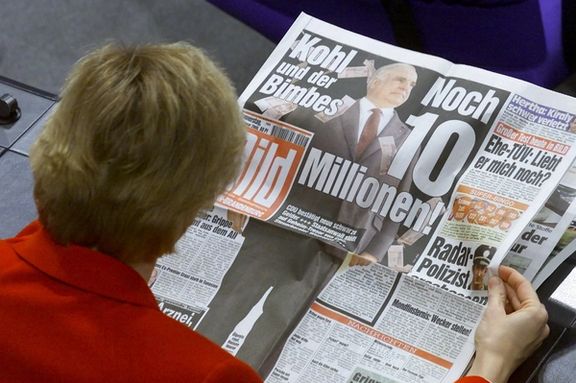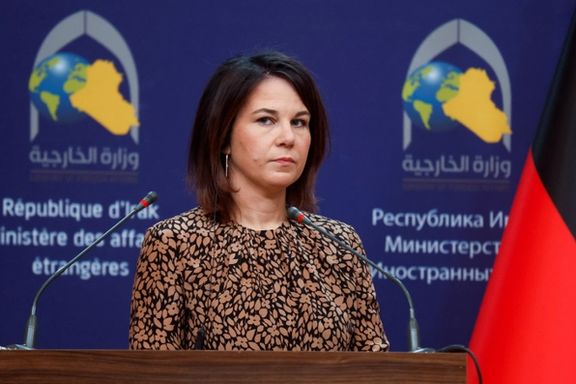Ripples Of Iranian Influence Operation Reach Germany

Media in Germany have been discussing a recent report by Iran International on an influence operation by the Islamic Republic of Iran in the US and Europe.

Media in Germany have been discussing a recent report by Iran International on an influence operation by the Islamic Republic of Iran in the US and Europe.
Iran International and Semafor this week simultaneously published similar versions of the report, shedding light on the Islamic Republic's influence network (IEI) within the United States and Western decision-making circles. The report garnered significant attention in the German media landscape. Notable publications such as Die Welt, Berliner Zeitung, Bild, and Taz have extensively covered this revelation.
Die Welt, in an article titled "A trace of the Iran network also leads to Berlin," emphasized the sensitivity of the publication’s timing and raised questions about the inclusion of a German name within the report. The publication expressed surprise at the lack of coverage by major American newspapers, including The Washington Post and The New York Times, regarding this crucial and sensitive matter.
Die Welt referring to an email sent by Adnan Tabatabai to Iranian former foreign minister Mohammad Javad Zarif, in which Tabatabai offers that members IEI (Iran Experts Initiative) could write articles to be published under the names of current or former Iranian officials potentially using false authorship, to promote Iran’s views in the West.
Die Welt's perspective underscores the uniqueness of this situation, noting that among the experts mentioned in the Iran International report, only Adnan Tabatabai disputes the authenticity of the disclosed documents. Regardless of the material's authenticity, the article raises questions about the boundaries between independent experts and their areas of expertise. It emphasizes that IEI members in this context have openly advocated for a diplomatic approach in negotiations with Iran, while emphasizing the importance of maintaining independence within their respective fields of expertise.

Berliner Zeitung has raised the possibility that one of Germany’s Ministry of Foreign Affairs partners, Adnan Tabatabai, may have acted as a "Ghost writer" for the Iranian authorities within Germany. This revelation has the potential to be a critical situation for FM Analena Baerbock.
There are suspicions that the Ministry of Foreign Affairs may have also provided support to a think tank closely aligned with the Iranian government.
According to Berliner Zeitung, Adnan Tabatabai has made multiple public appearances alongside Analena Baerbock in the past, and his think tank, Carpo, has received significant funding from the Ministry of Foreign Affairs. Over one million euros of public tax funds have been allocated to Carpo as a partner of the Ministry of Foreign Affairs for various dialogue projects. Adnan Tabatabai serves as the CEO of Carpo.
The discussion surrounding this issue has also been extensively covered by Taz and Bild. Bild, published a photo of Adnan Tabatabai alongside German Foreign Minister Baerbock, raising questions about potential ties to Iranian intelligence. The article implies that Tabatabai’s interactions with the federal foreign minister go beyond mere support for Iran's authoritarian regime.
Furthermore, Bild highlights a serious suspicion that Adnan Tabatabai actively engaged with the Iranian regime to promote public relations for Iran’s nuclear program. The leaked emails provide insights into how the Iranian regime utilized initiatives to influence the foreign policies of Western nations, with some experts reportedly obtaining government positions in the United States.
Despite being the sole individual vehemently denying the contents of the Iran International report, Adnan Tabatabai has repeatedly defended and whitewashed the Islamist regime in the media in recent years.
Die Welt claims that the German MFA has not answered its questions about Adnan Tabatabai, raising more questions about the extent of IEI's influence on the relationship between the United States and Iran.
However, the German MFA sent a short reply to the Berliner Zeitung, stating, “Previous project funding never resulted in privileged, exclusive, or advisory access to the Foreign Ministry.” In a recent interview with Die Welt, Tabatabai reported on his "exchange of content with employees of Germany MFA," based on current developments and conducted in person.